As an old hand at creating custom applications and mobile APIs, Gearheart shares why progressive web apps are used by such top companies as Google and Microsoft and what they are in contrast to usual web apps. Read on to learn what the most notable advantages of a PWA for a big or small company are and what makes PWAs different from other applications.

The Definition of PWA
As it is seen from its name, it is a type of an app, but it's different from what you see, say, on a Facebook or Youtube home page. Basically, it is a new approach that unites the traits of both classical web apps and convenient-to-use mobile apps, and here's how it works.
You navigate to a web page, and from the first sight, it behaves exactly like a usual browser application. But then you are offered to add the app to the home screen on your mobile phone, and if you accept, the best part begins.
The site starts working more like a mobile app as we know them than a browser application, which is believed to give more engagement. For example, even without a network connection you can open an app and view the last few opened pages or messages, or send some data that will be processed once the connection is renewed.
Progressive web applications were first developed a few years ago, and now they are gaining wide popularity, and here is why.
Benefits of Progressive Web Apps
These aren’t just convenient installable apps, they have a list of unbeatable features and basically, are setting a new trend in the IT world.
Offline Functionality
Unlike the usual web apps, such as Facebook, Instagram or many others, PWAs allow users to keep on interacting with the app even when they’re offline. When a user enters a website with a PWA feature, a browser stores the entire app (or caches it). So, when a user enters the website again, the information is entirely served from cache. When the device comes back online, the application re-synchronizes. Impressive, right?
An App and a Website at the Same Time
One of the main features of PWAs is that they bring an app-like experience to their users, but, at the same time, allow them to skip app store browsing and installation. In other words — they feel like a mobile app but work as an ordinary website and combine the best features of both. PWAs are able to provide users with features mostly associated with mobile apps, while opened in a browser. There are push notifications, background support, and more. View our portfolio to see what PWAs look like.
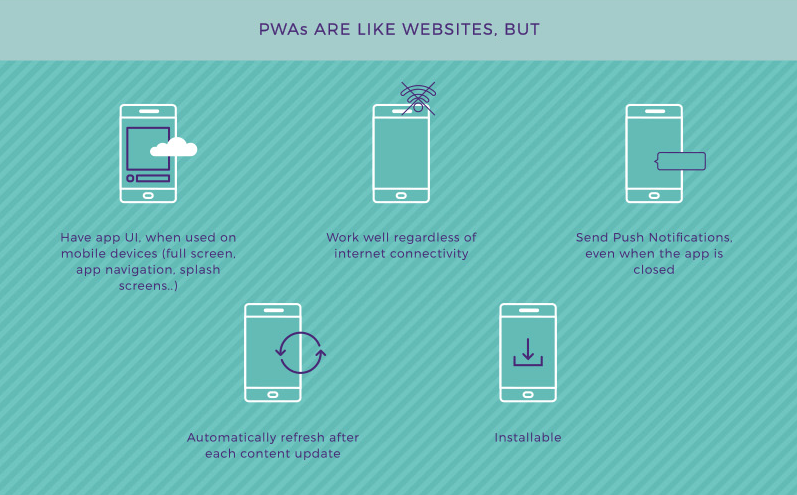
Significantly Improved Performance
As a matter of fact, PWAs are way faster than regular websites. Google mobile-first indexing lets you lower loading times and increase performance, and, as a result, boost user engagement. Everything is kept in cache, and it takes less time to upload the data, meaning the animation runs smoothly too. Our developer team uses the latest technologies to create the best performing PWAs. Find out more here.
No Long Installations
Another advantage of PWAs is that they take much less time to install than mobile device applications. Visitors can download your application directly from the website without surfing through app markets. Because it’s that easy, there is a higher chance that your app would find its place on a user’s device.
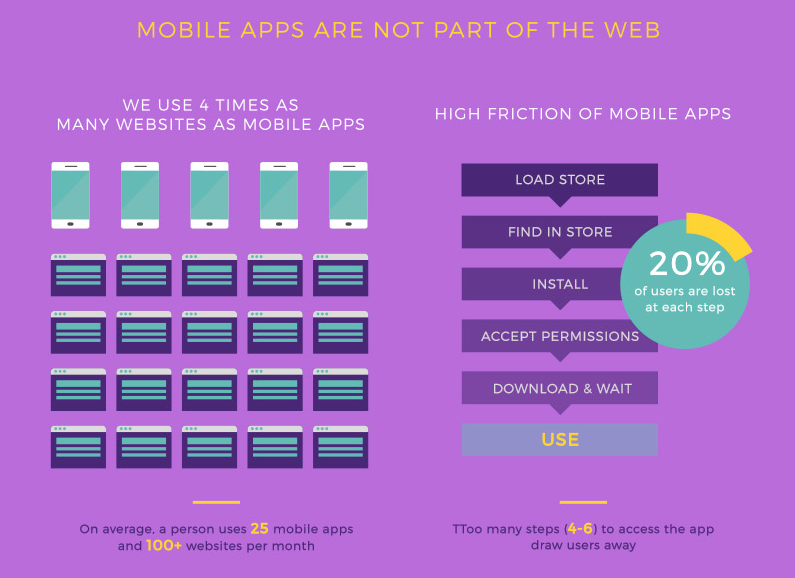
Push Notifications
Push notifications is another awesome thing that shows how PWAs can help businesses. These notifications attract the user’s attention and as a result increase engagement. Basically, it is an extra channel of communication with prospective customers, and a good way to remind them of your product.
No App Store Submission
The process of getting your app submitted to one of the app markets is time- and cost-consuming. Other than that, big app markets have a wide range of requirements and can remove apps without prior notification. Luckily, it’s very different with PWAs. You don’t need to follow any app stores’ rulings and your app is completely under your control.
Why Businesses Need PWAs
As you can see, PWAs combine the best of mobile and web apps. And we’d like to share the top arguments on how progressive web apps may be helpful to a business. Read on to find out why your company needs a PWA now and visit our website to learn more about PWAs we’ve already created.
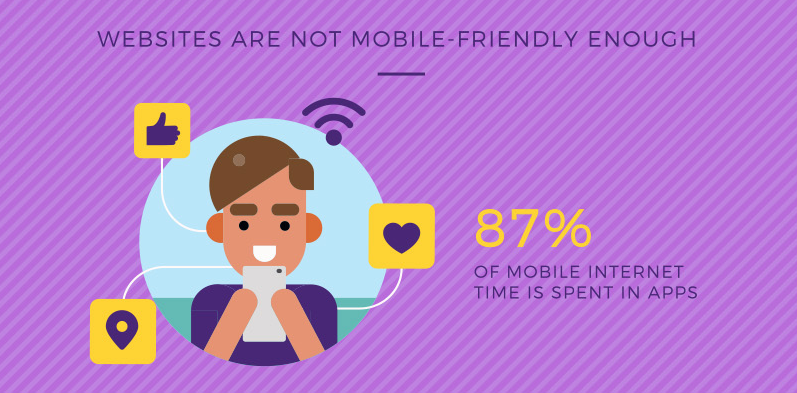
Users Prefer PWAs Over Traditional Apps
Simplicity is a strong PWA benefit. Many users find it easier to download an app from a website instead of searching for it in an app store, waiting for a long download, and learning how to use it from the beginning. Indeed, they’d better get a familiar app really fast, without any extra frustration.
Users Want the App Experience
Most of the mobile internet time is spent on apps. Yet, users take a step back when it comes to downloading a new one. Progressive Web Applications provide them with app-like interactions and navigations and fully satisfy their demand for app experience. So, easy-to-use and functional PWAs easily get users hooked.
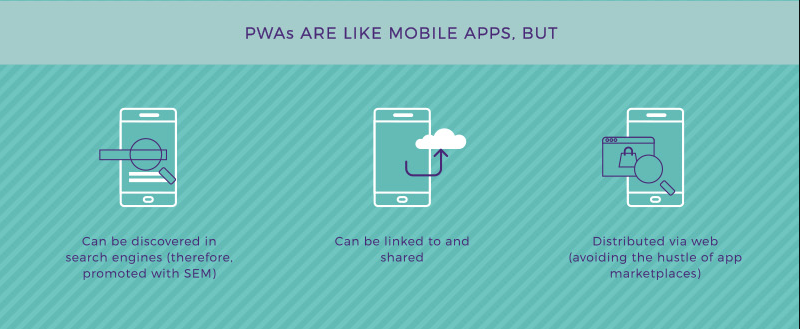
PWAs are Universal Tools
One of significant progressive web apps advantages is that it fits all types of operating systems, browsers and devices — it works on all kinds of PCs, laptops, and tablets. Therefore, it is easy to maintain the app and keep it running smoothly both online and offline. They are hosted on owner’s servers and can be easily modified — just like web pages.
Cross-Platform Support
What can be better than using an app on a laptop and then switching to the mobile with no loss in the app’s functionality? Users can use a PW app at work on their PC and then switch to mobile once they’re out. Naturally, cross-platform support and the ability to access a PWA from any device are among significant progressive web app advantages.
Updates Upon Use
Unlike with traditional mobile apps, developers can push all the necessary updates a PWA needs directly on the server, the same as with web apps. The other great thing is that there is no need to wait for the update approval because PWAs are not regulated by any app store. Plus, users don’t have to intentionally load the app store and download the updates (some people avoid it due to the lack of storage on their mobile devices), so you get the reassurance that they use most up to date version.
Affordable Development
It is cheaper to develop and maintain a PWA than a native app. Developing a mobile app suitable for all mobile platforms (or developing two separate apps) is quite costly. Yet, the price for PWA is significantly lower due to its functionality and ease of maintenance. Moreover, progressive web apps may bring a positive ROI (Return On Investment) faster and therefore — pay off in a shorter time. Find out about our pricing here.
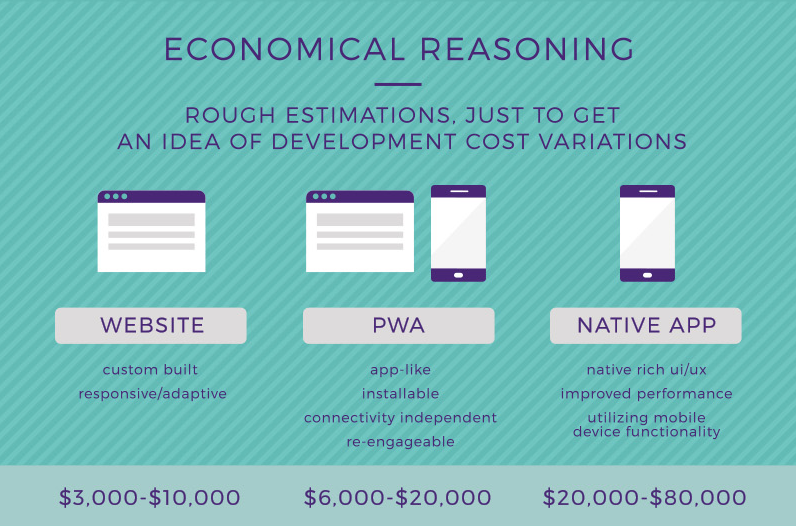
Extra Benefits for Businesses
Progressive web applications is a great tool not only for consumers but also for business owners. PWAs deliver services fast and therefore enable business owners to focus on business goals and new customers acquisition instead of being busy maintaining the process. Moreover, with PWAs companies save money on development and on promoting the app across different app stores.
Wrap Up
Progressive web apps are armed with the best modern goodies from both worlds — mobile and web apps: push notifications, offline mode, background support and more. These features bring new opportunities for business owners to reach their customers and have better user engagement.
World-known companies have already discovered how PWAs can work in their favor. Now that you know how progressive web apps can help businesses grow, consider implementing your idea in a PWA!
Progressive web applications are called "progressive" for a good reason. They use modern web capabilities to deliver an app-like experience for users. On top of that, they enhance the users' engagement. So, if you decide to develop your first PWA, take time to choose a reliable company. Check out their portfolio and who's in their team. Choose only experienced companies, such as Gearheart. As a matter of fact, the success of your PWA massively depends on the people who are going to create it. So, pick only the best one!



